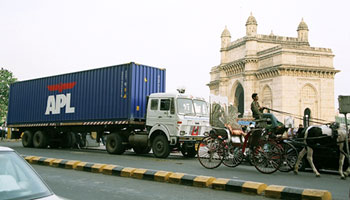COVER STORY
2006 INFRASTRUCTURE REPORT
2006 INFRASTRUCTURE REPORT
Fewer Chokepoints
India Infrastructure and Logistics Pvt Ltd (IIL), a joint venture with Hindu- stan Infrastructure Projects & Engineering Pvt Ltd (HIPE),
 |
| Roads are just one mode of infrastructure playing catch- up in India. APL Logistics and parent company NOL aim to do something about it in partnership with a national government increasingly open to private- sector participation. |
"India has the attributes and potential to become the next Asian manufacturing hub," said NOL's Group Deputy President Cedric Foo at the freight- rail announcement in March. "What has prevented India from realizing this potential is an under- investment in infrastructure."
"Land transportation in India is characterized by infrastructure 'choke- points,'" added Glenn, "and our investment in rail services is part of a larger commitment in developing new landside capabilities to meet our customers' needs for an integrated and seamless liner and logistics service."
That will be accomplished through NOL's APL Logistics subsidiary. In an e- mail interview, Glenn says India's manufacturing picture must merely catch up to the excellence already present in its services and IT sectors, and transport is the key.
"Today in India there are pockets of excellence but, as a whole, the system is not as well integrated and coordinated as it might be, which causes disconnects and delays that are unacceptable – particularly to global manufacturers," he says. "In fact, a McKinsey survey found that transit time from Indian factories to retail outlets in the U.S. were six to 12 weeks, compared with just two to three weeks from China."

